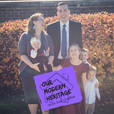
Summary: Life is all about stress. Distress or Eustress, it's all stress. Some people are in more distress than others. Regardless of our level of stress, we all have our ways of coping with the stressors of our lives. But not all coping strategies are good.<br> <br> I have been thinking a lot about this idea of how we cope with life's struggles. I talked about it a bit in my conversation with Bonnie Simon of Maestro Classics that if we could turn to creativity rather than consumption to cope, the world would be a different place!<br> <br> Over the course of the last decade I've endured many struggles.<br> <br> It started back in 2008 when Michael and I moved to Northern Virginia for school. Michael struggled to find employment while he got his graduate degree, and I was expecting our first baby. It went downhill from there.<br> <br> At first, we thought the struggles would be temporary.<br> <br> Michael would finish his degree, and find a good job. But then, the recession happened. The student debt, postpartum stress, new parenthood, and underemployment living in the most expensive area in the nation took its toll on us. We were far from home, with no family nearby. We also felt abandoned by our community.<br> <br> Some of our coping strategies were productive, but most weren't.<br> <br> The APA Dictionary of Psychology defines "constructive coping" as "any instrumental approach to stress management that is generally considered to be adaptive or otherwise positive" and goes on to describe two kinds of constructive coping:<br> <br> Problem-Focused Coping - "a stress-management strategy in which a person directly confronts a stressor in an attempt to decrease or eliminate it...Problem-focused coping is used primarily when a person appraises a stressor as within his or her capacity to change." Similar to "active coping," this is about knowing our responsibility and capacity for conscientiously working on our situation to affect change.<br> Emotion-Focused Coping - "in which a person focuses on regulating his or her negative emotional reactions to a stressor. Rather than taking actions to change the stressor itself, the individual tries to control feelings using a variety of cognitive and behavioral tools."<br> This perspective is so important. Some conflicts are simply shaped by our perceptions. Some are just bad habits, or beliefs about a situation. We don't always need to change a situation, and some things are still outside of our control.<br> <br> I am currently in the process of creating a course outlining what real coping looks like, and challenging our ideas around coping. The coping strategies I will be suggesting in the course are different from "defense mechanisms" or "escape mechanisms" defined as "an unconscious reaction pattern employed by the ego to protect itself from the anxiety that arises from psychic conflict." While some of the strategies I suggest may be a form of channeling emotional energy, I want to suggest ways to avoid escaping or denying the stressor altogether. In my experience, denial and escape can only gratify for a moment, and might even create more problems, while the initial conflict continues to go unsolved! I want to help more people realize that when we remain conscious to our reaction patterns, then we have more power over our situations than we might think.<br> <br> I also want to give you more tools than simple "passive coping" that involves wishful thinking, like I talked about in a blog post back in May 2018. When we give in to this idea that we simply cannot change our situation, then we give up. We give up our capacity to change anything, and leave it up to external forces, chance, or hope. Hope is not a bad thing in its proper form, but hope plus action equals faith. Faith requires action.<br> <br> For example, when you want a garden, you don't just sit and hope you can have one. You plant seeds,
